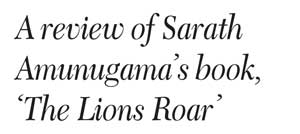Thursday Feb 19, 2026
Thursday Feb 19, 2026
Wednesday, 21 September 2016 00:02 - - {{hitsCtrl.values.hits}}
Dr. Sarath Amunugama and publisher Vijitha Yapa presenting Dr. Amunugama’s book entitled ‘The Lion’s Roar’
featuring the life and times of Sri Lanka’s famous Buddhist revivalist and writer Anagarika Dharmapala, to
President Maithripala Sirisena
“When I was about eight years old, my father took me to a carnival in Kandy around the time of the Esala festival. He bought me a ticket for a ‘lantern show’ that was drawing large crowds. When my turn came, I peeped through the lens and saw a series of 
 coloured slides of Bodhagaya, the Mulaghandhakuti in Saranath, some famous Buddhist sites in India and finally a slide of a handsome middle aged man in a yellow dress. That was Angarika Dharmapala.”
coloured slides of Bodhagaya, the Mulaghandhakuti in Saranath, some famous Buddhist sites in India and finally a slide of a handsome middle aged man in a yellow dress. That was Angarika Dharmapala.”
With this powerfully meditative and emotive reminiscence, Sarath Amunugama frames his first encounter with Angarika Dharmapala in his book ‘The Lion’s Roar Anagarika Dharmapala & the making of Modern Buddhism’. It is an effort that can be unreservedly acclaimed as an academic tome and abrilliant socio cultural commentary of the 20th century Sinhala Buddhist ethos. Dharmapala pierced the doctrinaire monopoly of the priestly class and a motivated middles class Buddhist laity assumed the burden of preserving and propagating the Dhamma. Sarath Amunugama tells the story with a sangfroid that is essentially Sarath. Adulatory praise is in order. He has done what Isaac Deutscer did with Trotsky.
He disentangles the many facets of the messianic preacher and founder of the Maha Bodhi Society. He explains why and how he made Buddhism the vehicle of identity formation of the Sinhala people under colonial rule. With characteristic élan he has produced a treatise that unravels Anagarika Dharmapala whose giant shadow still looms large, compelling President Sirisena to nuance the cry ‘Sinhalayini Awadiwew to a more inclusive ‘Lankikayini Awadiwew.’
Unlike his illustrious predecessors in the same sciences, – perspicuously penetrative Stanley Thambiah, elegantly academic Gananatha Obeysekera and donnishly detached H.L. Seneviratne, the relatively younger scholar with the added advantage of being both ‘Kandyan’ peasant and cosmopolitan, is canny critic, eloquent raconteur and social historian.
“What emerged from Dharmapala’s syncretism was not a mere transformation of contemporary Buddhist practices, referred to in sociological literature as ‘ Protestant Buddhism’ but a modernist interpretation of Buddhism which has had a profound impact on present day Buddhist thought and action.” [P 6 Chap1]’
With meticulously researched material gleaned from the diaries of Dharmapala who renounced worldly pleasures, yet assiduously followed the progress of the family business, cloistered in his ‘Asharam,’ he explains how the Angarika – one with no home of his own, ‘ delinked ‘Niravana’ from day to day Buddhism and linked it to an incipient mercantilism.
The opening lines in Amunugama’s preface, clearly trace the trajectory of his prodigious exploration of the phenomenology of Anagarika Dharmapala.
Born in to a family of more than substantial wealth, Anagarika Dharmapala who was named Don David Hewavitharne was a man of piety and great intelligence. The magic lantern represents the modernity that Dharmapala infused in to the sedentary lives of the Sinhala people then in quiet repose under the all-powerful British Raj. His call ‘Sinhalayini Awadiwew, ‘an awakening call that presupposes the depth of the Sinhala slumber was no tribal cry. It was a cry intended first to retrieve the sacred shrine of Bodhgaya for the Buddhist world. Secondly and far more importantly it was to awaken the masses to assert their dignity at a time when aspirations to be free from colonial rule was confined to an elite, yet in half mind to relinquish their comprador roots.
The magic lantern etched in the memory of a child in the era of the Second World War is, also symbolic of the ‘Illuminati’ who propelled forward Buddhist interests after independence. Amunugama patiently traverses a tricky terrain. Dharmapala had little patience with the laid back Buddhist clergy. Yet at the same time he had enormous respect for the Institution of the ‘Sangha’ and held priests such as Hikkaduwe Simangala thero and Rathmalane Dhmmarama thero in high esteem.
In that specific zeitgeist Anagarika Dharmapala was both modern and liberal. He elevated the laity to a higher plane. By his direct  appeal to Buddhist masses Dharmapala firmly established a new tradition of the laity operating on an equal footing with the Buddhist priesthood on matters evangelical.
appeal to Buddhist masses Dharmapala firmly established a new tradition of the laity operating on an equal footing with the Buddhist priesthood on matters evangelical.
Amunugama describes the uneasy chemistry between Olcott and Dharmapala. He tacitly explains the mysticism that was an essential ingredient of the Dharmapala persona.“…. Dharmapala believed that an imminent force guided his actions,” The strange turn of events that led to Dharmapala’s eventual presence at the Parliament of Religions in Chicago where he stressed on the universal appeal of Buddhism are narrated in such detail that the reader has to arrive independently on what is spirit and what is spiritual.
The Messiah appealed to a new constituency of Sinhala Urban entrepreneurial class.“Aliens are taking away the wealth of the country, and the sons of the soil, where are they to go to? Is it just that the sons of the soil should suffer while the alien enjoys?” The most salutary aspect of Dr. Amunugama’s work is that he frames these exhortations of Dharmapala in the social economic milieu of the time. The reader can separate the ‘wheat’ of the man driven by piety from the chaff of the label of ‘bigotry’ that is pasted on his memory by liberal minds well-intentioned but ill informed.
Sarath Amunugama does not say it. In the opinion of this writer, the prescriptive rights claimed by the Don Carlo is a claim on the Mahabodhi legacy and even to this day is evidence of the missionary mercantilism that the revered sage inadvertently produced. It has now permeated our entire polity.
It is a great read. It is a must-read... I wait for the conclusion of O level exams. I will go through the tome again, page by page with my only grandson who by the looks of it, may scrape through the compulsory paper on Buddhism. Compulsory because in Post Dharmapala, the received wisdom in Sri Lanka is that piety and morality can be ensured by statute.
Having read the almost 700 pages with the same unreasonable relish of a court drama by John Grisham or a historical fiction by Ken Follett, a more sustained second approach was necessary for me to grasp the essence of the Dharamapala phenomenon, distilled with the academic rigor of a sharp, sensitive and spirited mind. It is expressed with sparkling clarity in spontaneous phrase. A doting father compelled him in to the civil service. Fortuitous circumstances got him in to politics. None of these diversions have affected the inherently curious mind of the inveterate scholar.